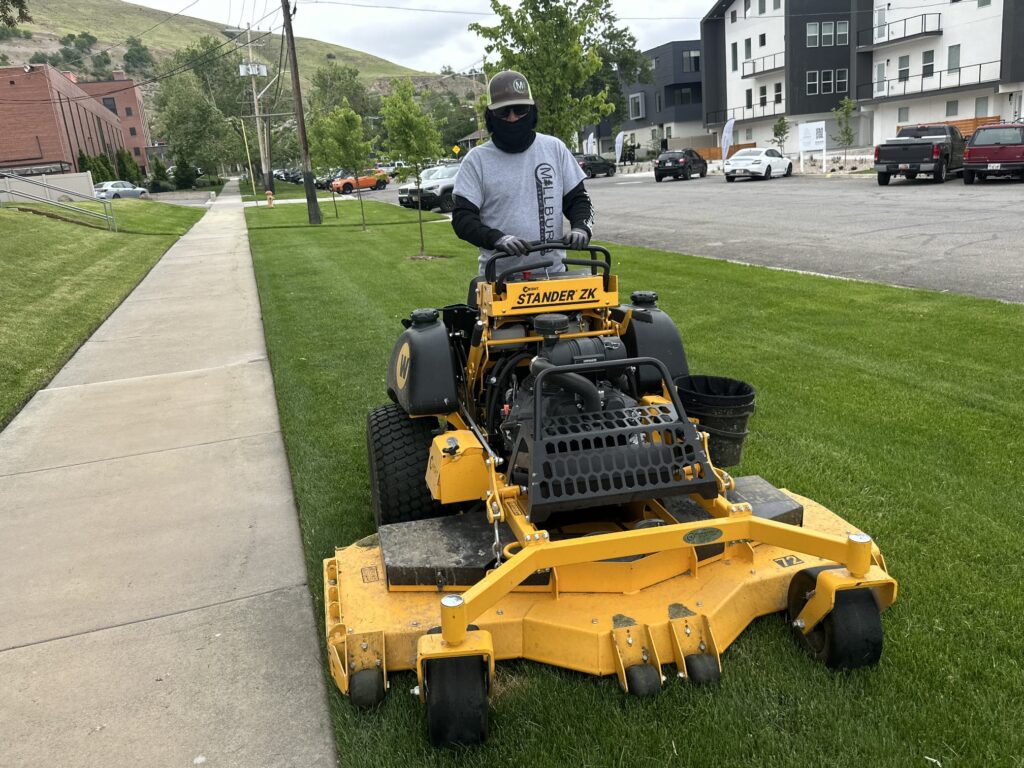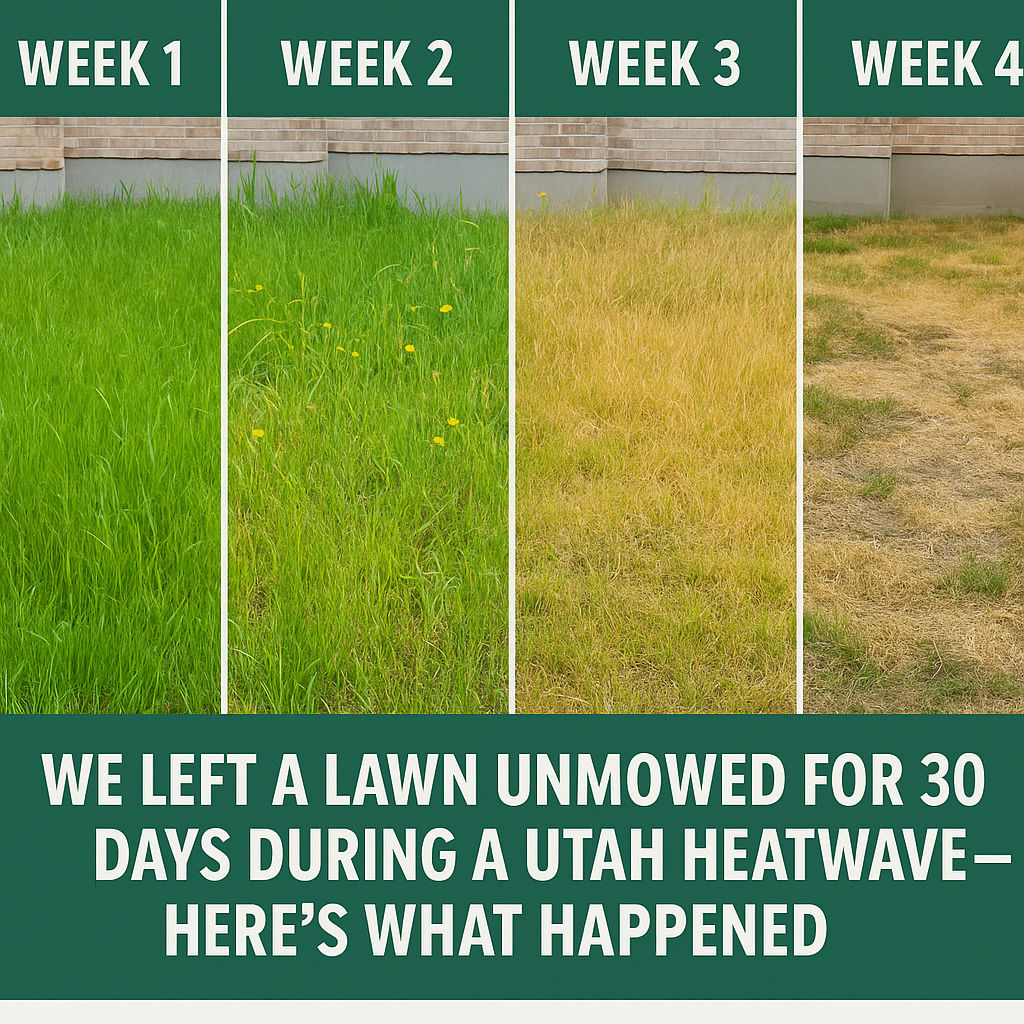In the name of lawn science (and a little curiosity), we decided to do something most homeowners would never risk:
We left a lawn in Lehi, Utah completely unmowed for 30 days during the peak of a Utah heatwave—and we documented every week.
Why? Because many Utah homeowners believe that letting grass grow tall during extreme heat will protect the soil and reduce stress. But is that really true?
Spoiler alert: Long grass doesn’t always equal lawn protection, especially when it’s left alone for a month in 100+ degree temps.
This time-lapse breakdown reveals what really happens, debunks a few common myths, and shows how to recover a neglected lawn before it’s too late.
Week 1: Grass Grows Fast—but Unevenly
During the first 7 days, the lawn in Lehi looked just a little longer than usual. The green was still vibrant, and morning dew clung to the blades. But by the end of the week, the signs of stress started showing:
- Uneven growth patterns
- Taller seed stalks forming
- Soil moisture began evaporating faster due to rising temps
What we expected: Healthy, tall turf protecting the soil
What actually happened: Grass started growing in clumps, opening gaps for weeds
Week 2: Weed Colonies Take Over
By day 14, dandelions, thistle, and crabgrass began popping up across the lawn. With the grass shading the soil inconsistently, weeds found open real estate and thrived in the hot, dry conditions.
- Turf thinned noticeably
- Weed seed heads matured
- Insects began nesting in denser patches
Despite common advice that “long grass protects the soil,” the lack of mowing allowed uncontrolled weed growth and turf competition.
Week 3: Lawn Enters Stress & Dormancy
Related long-tail keyword: common myths debunked about long grass and soil protection
By the third week, temperatures hit triple digits in Lehi. We noticed the lawn turning yellow and limp—classic signs of heat stress and dormancy. The longer blades couldn’t retain moisture without proper cutting, and the thick canopy began to block air circulation.
- Grass turned brittle and brown near the roots
- Stalks folded or laid flat in the heat
- Lawn began to repel water rather than absorb it
Myth debunked: Long grass doesn’t always help your lawn survive a Utah heatwave. It needs to be managed, not abandoned.
Week 4: Fungal Patches, Bare Spots & Mower Mayhem
By day 30, the lawn was barely recognizable.
- Large brown patches spread across the yard
- Fungal spots appeared from retained moisture in shaded areas
- Attempting to mow resulted in scalping and clumps
- Mower struggled to cut through dense stalks, damaging turf
Attempting a “catch-up mow” caused more damage than good.
What It Took to Recover the Lawn
To bring the lawn back to life, we had to:
- Mow in stages (cut down by 1/3 at a time, across several days)
- Aerate to improve airflow and water absorption
- Apply a light top dressing to repair compacted soil
- Overseed to fill in dead spots
- Water deeply every 2–3 days to encourage root regrowth
- Spot-treat weeds and fungal areas
Estimated recovery cost: $350–$500
Estimated full recovery time: 4–6 weeks
What We Learned (So You Don’t Have To)
Key takeaway:
Tall grass isn’t the problem. Uncontrolled growth is. Without regular mowing—even during heat—your lawn becomes a breeding ground for weeds, fungus, and turf stress.
Here’s what to do instead:
- Mow weekly, but raise the mowing height to 3.5–4 inches during a heatwave
- Don’t bag clippings—mulch them to add shade and nutrients
- Deep water 2–3 times weekly, early in the morning
- Keep an eye out for yellowing or weeds, which indicate stress
Frequently Asked Questions
Q: Will letting my grass grow longer protect it during a heatwave?
A: Not if you skip mowing for weeks. Tall grass still needs trimming to prevent weed growth, fungal buildup, and soil compaction.
Q: What’s the best way to water my lawn during a Utah heatwave?
A: Deep watering 2–3 times per week is best. Avoid daily light watering, which encourages shallow roots.
Q: Can you recover a lawn that’s been neglected for 30 days?
A: Yes—but it will take aeration, overseeding, careful mowing, and deep watering. Total recovery can take 4–6 weeks or longer.
Q: Is it bad to mow over long, dry grass all at once?
A: Yes. Doing so can scalp the lawn and shock the grass. Always mow in stages to minimize stress.

Don’t Let Your Lehi Lawn Go 30 Days Without Help
We did this experiment so you wouldn’t have to. If you’re in Lehi or nearby and worried about keeping your lawn alive during summer, Saratoga Mowing has your back.
✅ Weekly mowing
✅ Drought-smart techniques
✅ Recovery plans for stressed turf
👉 Get a free quote today and let us help your lawn thrive—even in the heat.


